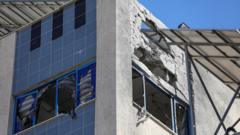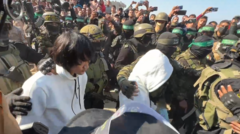The head of the WHO, Dr. Tedros Adhanom Ghebreyesus, highlighted urgent healthcare threats in Gaza following recent assaults on hospitals. Forces have claimed these hospitals were used by Hamas, prompting widespread condemnation and calls for immediate action.
Humanitarian Crisis: WHO Calls for Protection of Hospitals in Gaza

Humanitarian Crisis: WHO Calls for Protection of Hospitals in Gaza
The World Health Organization demands cessation of violence against medical facilities in Gaza amidst escalating conflict.
Dr. Tedros Adhanom Ghebreyesus of the World Health Organization (WHO) has issued a stark warning concerning the situation in Gaza, where hospitals are now battlefield fronts amidst ongoing military operations. He implored all parties to cease attacks on these vital healthcare facilities. His remarks followed alarming incidents that transpired over the recent weekend, where the al-Ahli hospital and several other hospitals faced direct assaults.
The situation escalated dramatically on Friday, with the Israeli military forcibly evacuating the Kamal Adwan hospital, which had served as the last functioning medical facility in northern Gaza, further exacerbating the region's healthcare crisis. Dr. Tedros highlighted that hospitals are at risk and called for the immediate release of detained medical personnel, including Dr. Hussam Abu Safiya, the hospital’s director.
The Israeli military justified its actions by labeling the hospital a Hamas stronghold and reported the killing of 20 alleged militants alongside detaining 240 others during the assault. However, they provided limited evidence to substantiate their claims, leading to a generate condemnation from various human rights advocates and organizations.
MedGlobal, a humanitarian organization from the U.S., denounced Dr. Abu Safiya's detainment as a severe infringement upon international humanitarian law, emphasizing the necessity for medical personnel to be safeguarded in conflict situations. Concern is growing for Dr. Abu Safiya’s health as he recuperates from previous injuries.
The WHO's urgent response included delivering essential supplies and transferring critically ill patients from the Indonesian hospital, which is in dire condition and incapable of providing adequate care. Dr. Tedros called upon Israeli authorities to ensure the well-being of both patients and medical staff amidst the chaos.
As violence escalates, the Israeli offensive continues targeting regions in northern Gaza with little to no access to humanitarian relief. Dr. Tedros added that previous assaults on hospitals, such as the al-Wafa Rehabilitation Hospital, have resulted in casualties among patients and medical staff.
Witness accounts from survivors within these facilities paint a harrowing picture of the turmoil. A medical student described the chaos during the bombardment at al-Wafa hospital, marking a traumatic experience that has left many in shock and distress.
Displaced residents voiced their fears of escalating violence, expressing despair over continual attacks on civilian shelters, further stressing the humanitarian crisis the region faces. Israel's military actions have been seen as responses to a significant attack from Hamas, which claimed lives and led to numerous hostage situations.
The conflict has tragically taken an immense toll, with estimates indicating over 45,540 fatalities in Gaza since recent hostilities began, according to local health authorities. The ongoing strife raises urgent questions about the impact on civilians and the importance of adhering to humanitarian laws to protect the vulnerable amidst conflict.
The situation escalated dramatically on Friday, with the Israeli military forcibly evacuating the Kamal Adwan hospital, which had served as the last functioning medical facility in northern Gaza, further exacerbating the region's healthcare crisis. Dr. Tedros highlighted that hospitals are at risk and called for the immediate release of detained medical personnel, including Dr. Hussam Abu Safiya, the hospital’s director.
The Israeli military justified its actions by labeling the hospital a Hamas stronghold and reported the killing of 20 alleged militants alongside detaining 240 others during the assault. However, they provided limited evidence to substantiate their claims, leading to a generate condemnation from various human rights advocates and organizations.
MedGlobal, a humanitarian organization from the U.S., denounced Dr. Abu Safiya's detainment as a severe infringement upon international humanitarian law, emphasizing the necessity for medical personnel to be safeguarded in conflict situations. Concern is growing for Dr. Abu Safiya’s health as he recuperates from previous injuries.
The WHO's urgent response included delivering essential supplies and transferring critically ill patients from the Indonesian hospital, which is in dire condition and incapable of providing adequate care. Dr. Tedros called upon Israeli authorities to ensure the well-being of both patients and medical staff amidst the chaos.
As violence escalates, the Israeli offensive continues targeting regions in northern Gaza with little to no access to humanitarian relief. Dr. Tedros added that previous assaults on hospitals, such as the al-Wafa Rehabilitation Hospital, have resulted in casualties among patients and medical staff.
Witness accounts from survivors within these facilities paint a harrowing picture of the turmoil. A medical student described the chaos during the bombardment at al-Wafa hospital, marking a traumatic experience that has left many in shock and distress.
Displaced residents voiced their fears of escalating violence, expressing despair over continual attacks on civilian shelters, further stressing the humanitarian crisis the region faces. Israel's military actions have been seen as responses to a significant attack from Hamas, which claimed lives and led to numerous hostage situations.
The conflict has tragically taken an immense toll, with estimates indicating over 45,540 fatalities in Gaza since recent hostilities began, according to local health authorities. The ongoing strife raises urgent questions about the impact on civilians and the importance of adhering to humanitarian laws to protect the vulnerable amidst conflict.























